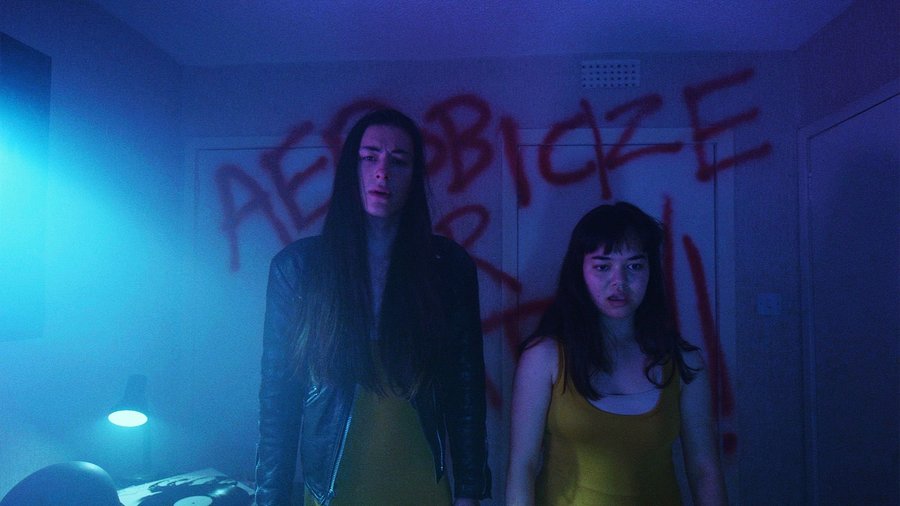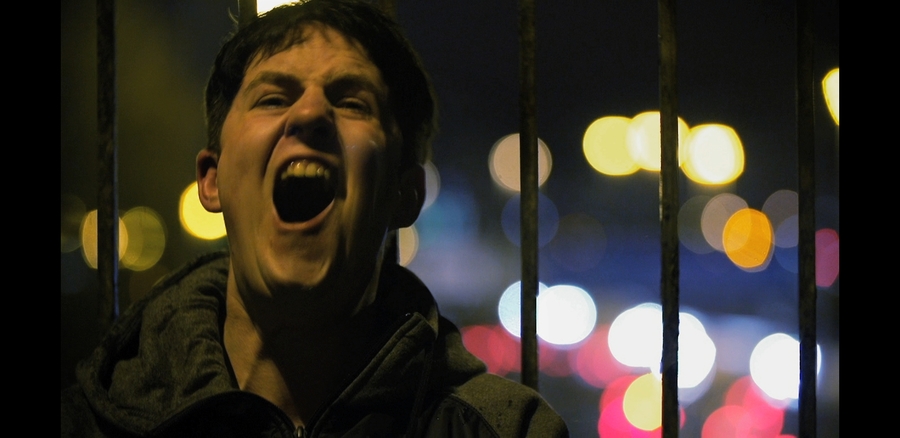Short Films on TV: Random Acts and BBC Scotland
With Scotland's vibrant short film scene and myriad online platforms, it's never been easier to see short films – thanks to programmes like BBC Scotland's Next Big Thing, there are plenty of opportunities to stumble across shorts on TV too
For a long time, I assumed my first introduction to the lush cinema of Jane Campion was The Piano. As a pretentious teenager, the Kiwi’s Palme d’Or-winner, with its striking visual aesthetic and gently elliptical storytelling, was very much my cup of tea. Years later as a university student, while attending a 16mm programme of Campion's early shorts, I discovered my first foray into her work was much earlier.
During the first few seconds of Peel, Campion's jarring short from 1982 about an incredibly tense car journey, my memories of seeing this spiky little film on TV came flooding back. The violence of Peel’s edits, the visceral sound design of thundering traffic, and the vividness of the close-ups on the three ginger-haired characters (a woman, her brother and his son/her nephew) as they bicker by the roadside. It all transported me to some point in the early 90s, catching the film by chance on BBC Two’s Moving Picture series.
I think what seared Peel so firmly into my cerebral cortex was the context. Coming across it while channel-hopping between sitcom reruns, cheesy game shows and Daz doorstep challenges, this eight-minute wonder stood out like a nosebleed on freshly-fallen snow. Any film fan who came of age pre-YouTube will probably have a similar story to tell, of coming across a surreal short in the graveyard slot on Channel 4 or some weird Eastern Bloc animation before the early morning cartoons; films too avant-garde to take up space in primetime slots, but perfect in those awkward gaps between programmes when the audience at home is either half asleep or still rubbing last night's sleep from their eyes.
Random Acts on Channel 4
Thanks to the internet, filmmakers now have myriad options for showcasing their short film work; some go viral, some languish with a handful of views. The proud tradition of short films on television is still being kept alive, though, thanks to Random Acts, a collaboration between Channel 4 and the Arts Council that has seen hundreds of bite-sized shorts from emerging filmmakers commissioned, which are then showcased on the channel’s various platforms, including on television.
For Cathrine Bray, Random Acts’ commissioning editor, the aim is simple. “I want to enable filmmakers to make films they wouldn't always get to make elsewhere,” she tells us. “Hopefully films which surprise us, and films which genuinely hold the attention of the audience.” Her focus is very much on new talent. “I like it when we find people who exist a bit outside the system and enable them to create something that makes people sit up and take notice.”
One filmmaker who fits this bill is Bryan M. Ferguson, a maverick young director from Glasgow with an immediately recognisable visual style and a penchant for the extreme. When The Skinny screened his short film Flamingo, about a young woman turned on by amputation, at the 2016 Glasgow Short Film Festival, not one but two grown men fainted in the audience. Satanic Panic '87, Ferguson’s new film made for Random Acts, which screens in October as part of Channel 4's FilmFear season, is a wild blending of early-Sam Raimi with J-Horror as two goth kids do some dark deeds to open a gateway to hell via a satanic aerobics workout VHS.
Satanic Panic '87 is the kind of imaginative, outsider art that Channel 4 has been championing since its inception. It was clearly a positive experience for Ferguson. "When you first get involved in something like this you automatically think you might lose out on your own stamp on the project," he tells us, "but they are really supportive and genuinely encourage the filmmakers to be innovative without obstruction, which was really liberating." The film appearing on the channel, a prospect Ferguson calls surreal, is also validating. "I’ve been working on my stuff without any sort of institutional funding for close to ten years and to have my latest film be commissioned by and set to premiere on Channel 4 feels like a real affirming moment in my career. It’s an exciting time."
You can find Random Acts' shorts on myriad platforms, but Bray doesn’t want to impose any hierarchy. “It's exciting in different ways to see your film play in a theatre on a massive screen to an audience of hundreds, on TV to an audience of hundreds of thousands, or online to an audience of anywhere between millions and dozens – the unpredictability of online is what makes it exciting…” she says. Bray notes, though, that television does have an advantage over these other mediums in one respect: accidental discovery.
“You can be watching one programme, and simply by carrying on watching, you're suddenly watching something completely outside your comfort zone. Online, there's an algorithm usually trying to match you with content it predicts you will like. With TV, there's a human scheduler, and they might be trying to match what they think you'll like, but they might also be trying to throw you a tastefully curated curveball.”
Next Big Thing on BBC Scotland
Since the introduction of BBC Scotland back in February, Scottish viewers have been privy to similar curveballs thanks to Next Big Thing, a series that acts as an overview of recent short films to emerge from Scotland’s lively short film scene. Louise Thornton, BBC Scotland’s commissioning executive for digital, social and youth, curates the series. “When I got this job, one of my objectives was to champion young talent,” Thornton tells us.
Before her role at the new channel, Thornton had worked on the BBC's popular digital platform The Social. “I was always aware there was all this brilliant talent out there in Scotland and The Social was trying to go some way to break down the walls of the BBC and bring people in who we can work with that we might not know about, many of whom were already filmmakers in their own right doing lots of short films. So I was very much aware there was all this brilliant content being made and I knew there was obviously the Glasgow Short Film Festival and all these other little brilliant outlets, but we as the BBC weren't showing any of these shorts.”
As part of her new commissioning responsibilities, Thornton was given some late-night slots to play with. “It felt like a space where we could experiment a bit more and start working with some of these filmmakers," she explains, "particularly the ones that have won awards and done well on the festival circuit.” This kind of programming also reminded her of watching TV in the pre-internet days. “When I was growing up, late night on terrestrial channels before the internet you could just find lots of weird and wonderful things, so I suppose I was quite inspired by that as well as platforms like MUBI, where they are collecting just really fantastic stuff in one place. You can kind of go in blind and know you'll find something of interest.”
The films that have screened on Next Big Thing will be familiar to those with one eye on Scotland’s short film scene. James Price’s bracing slice-of-life drama Concrete & Flowers is the most recent film on the channel at the time of writing, while Ainslie Henderson & Will Anderson's stop-motion animation Monkey Love Experiments is next down the pike. Award-winners like Tim Courtney’s My Loneliness Is Killing Me, Alia Ghafar’s Salt & Sauce and Robin Haig's Hula have also turned up on the channel.
Glasgow Short Film Festival
One thing that connects the above is that they’ve all appeared at Glasgow Short Film Festival over the last few years. “Any initiative that brings more short film to TV should be applauded,” says GSFF’s director, Matt Lloyd, when we asked his thoughts on Next Big Thing, “and it’s a great opportunity for the many fantastic filmmakers who have been featured.” GSFF’s co-director, Sanne Jehoul, adds that TV somehow helps free short films from the association that they’re difficult to penetrate. “While of course we’d want festivals to be as accessible as possible to all audiences,” she says, "there’s no denying that TV opens these kinds of works up to audiences that might not be at all familiar with short film festivals or online platforms for short film exhibition."
While Jehoul and Lloyd are delighted that these works are finding a wider audience thanks to BBC Scotland’s enthusiasm for screening short films by emerging filmmakers, there is some scepticism about the approach. Jehoul doesn’t seem convinced the series engages with the depth and breadth of Scotland’s moving image scene. “I do think unfamiliarity with the wider artistic and industry scene might limit what is shown,” she suggests, “and how it could be seen in the context of other work and practices. It still feels a bit like it’s not being considered in its appropriate context or as its own art form, and programming decisions can consequently seem somewhat arbitrary.”
Lloyd has similar misgivings: “I would suggest that the range of work selected for Next Big Thing could be much wider. There are plenty more wonderful shorts which deserve to reach audiences across Scotland.” The series’ name is also problematic. “If I’m honest, I think to present filmmakers on TV as the ‘Next Big Thing’ seems a bit reductive,” Lloyd says. “It draws the focus away from the work itself; it reinforces the idea as shorts as mere stepping stones, not to mention putting the pressure of expectation on the filmmaker.”
Despite these concerns, the series does seem to be making good on its title. “Quite a few of the directors that have worked in some of the short films that I've put out as part of Next Big Thing, I now see them popping up in other things that we're working on,” reveals Thornton. For example, Siri Rodnes, the director of Take your Partners – the first film to screen on The Next Big Thing back in February when BBC Scotland launched – has made a pilot. Pancake, a mock-doc mini-drama set at an elite ballet school, will screen in the autumn along with three other new pilots, on of which will be chosen to go to series. “That really feels like what we're set up to be doing in BBC Scotland.”
Next Big Thing continues on BBC Scotland
Selected Random Acts films will be broadcast on Film4 this October as part of Black History Month and FilmFear
Glasgow Short Film Festival, 18-22 Mar 2020

